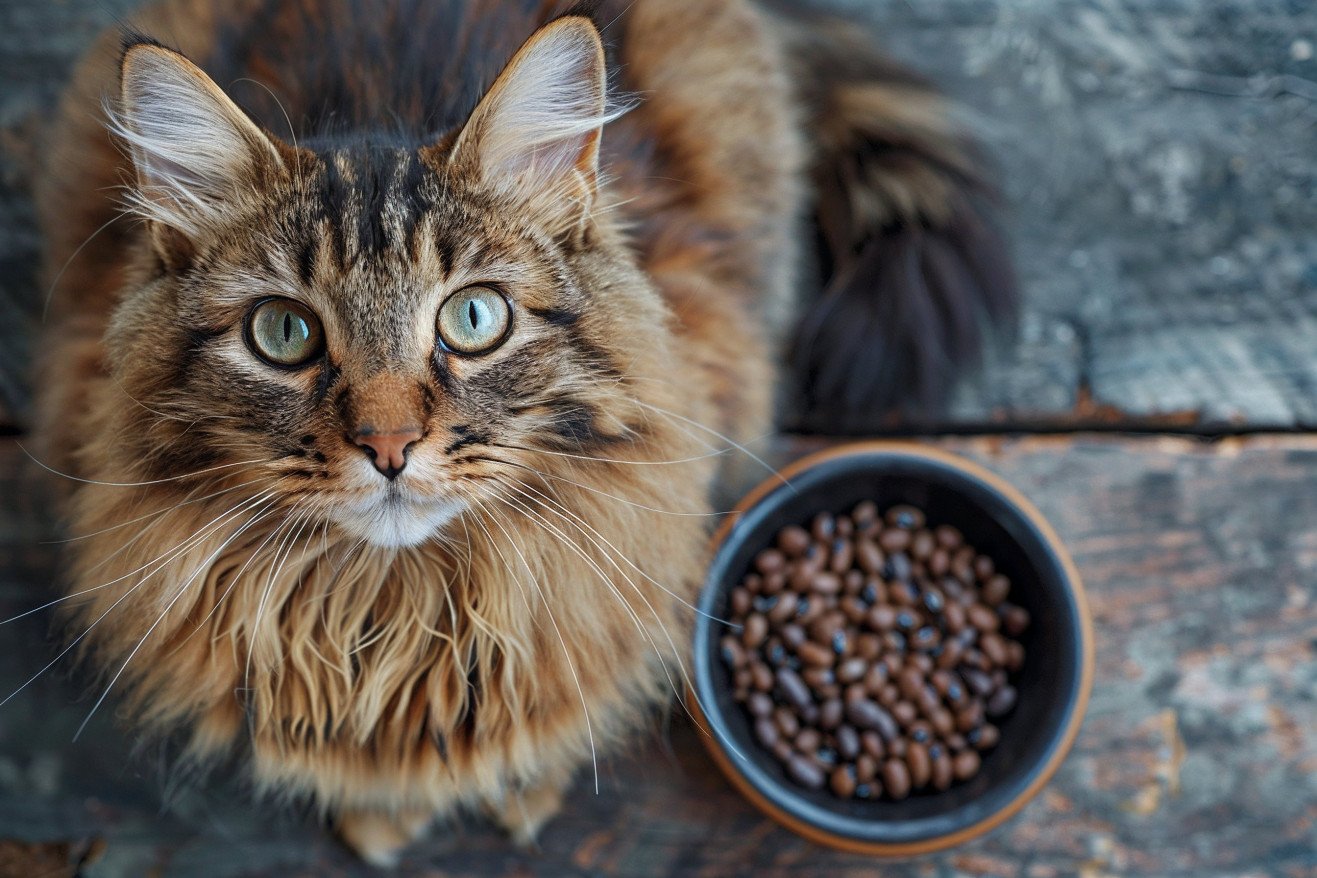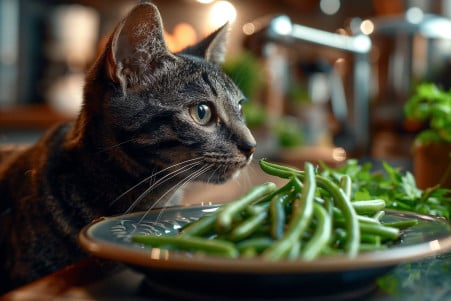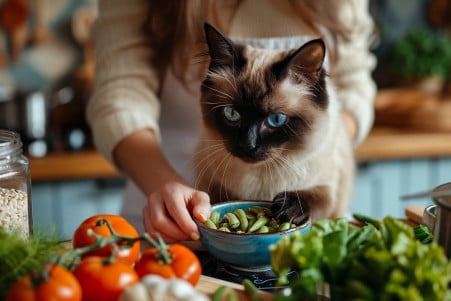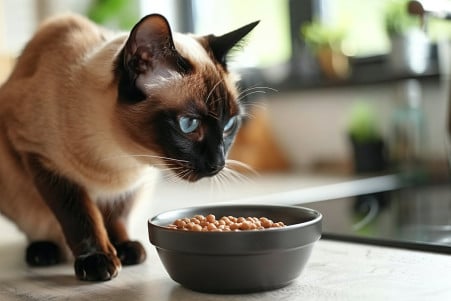Can Cats Eat Black Beans? What Pet Owners Need to Know
4 June 2024 • Updated 3 June 2024

Black beans are a great source of protein and are packed with other nutrients, so it’s natural to wonder if they’re safe for your cat to eat. While black beans are not toxic to cats and can be a good source of fiber, antioxidants, and plant protein in small amounts, it’s important to make sure they’re cooked well enough to be easy for your cat to digest.
To get a better idea of the potential benefits and drawbacks of feeding cats black beans, we can turn to the latest studies by veterinary nutritionists and other experts in feline health. Their work can help us better understand what cats need in their diet and how adding legumes like black beans can affect their health. Armed with this knowledge, cat parents can decide whether or not to feed their cats black beans as an occasional, supplemental treat.
Can cats eat black beans?
Nutritional Needs of Cats
Because they are obligate carnivores, cats have nutritional needs that are different from those of other pets. In particular, their diets must be high in animal-based proteins, fats, and other essential nutrients that are found in meat and animal products. Some of the most important nutrients that cats need are:
Animal protein to support the growth and maintenance of muscles, skin, fur, and other tissues. Cats need more protein than many other animals.
Fats such as omega-3 and omega-6 fatty acids to provide energy, support skin and coat health, and reduce inflammation.
Limited carbohydrates because cats have evolved to get most of their energy from protein and fat.
Water to support metabolic processes. Cats often need to drink water in addition to what they get from their food.
Vitamins like A, D, B1, B2, B3, and B6 that cats can't make in sufficient amounts on their own.
Minerals such as iron, calcium, magnesium, potassium, sodium, and chloride that support enzyme activity and other bodily functions.
A diet that provides the right amounts of these nutrients in a healthy balance is considered a complete diet and can be achieved with high-quality commercial cat foods. While homemade diets can be nutritionally complete, it can be challenging to ensure that they provide all of the essential nutrients. This is one reason that non-meat foods like black beans should be reserved for special occasions rather than being a regular part of a cat's diet.
Risks of Feeding Your Cat Black Beans
While black beans are not poisonous to cats, they can cause digestive issues if eaten in large quantities. Bond Vet lists the most common signs of digestive problems in cats as vomiting, diarrhea, decreased appetite, weight loss, fever, dehydration, and abdominal pain.
Raw or undercooked beans can contain toxins such as phytohemagglutinin, which can lead to severe gastrointestinal distress and even impact the nervous system. Cats don’t have the enzymes necessary to break down certain compounds in beans, which can lead to digestive issues.
If a cat eats a large amount of beans, it’s important to get them to a vet right away to treat any potential toxicity and prevent other issues. To avoid these issues, make sure to feed your cat black beans in moderation and cook them thoroughly.
Other Beans That Are Safe for Cats
If you're looking for an alternative to black beans that you can give your cat as a treat, there are other beans that are less toxic and can be given to cats in moderation. Cats.com notes that green beans can be given to cats as long as they are cooked and unseasoned, and they can provide fiber, vitamins, and minerals to your cat as a healthy treat. Chickpeas and lentils are also safe for cats in small amounts, but you should introduce them to your cat slowly and keep an eye out for any negative side effects.
However, TrustedHousesitters.com warns that canned, baked, and refried beans are not safe for cats because they often contain salt, spices, and preservatives that can be toxic to cats. In addition, cats should never be given coffee beans or cocoa beans because they contain caffeine and theobromine, which are toxic to cats.
How to Feed Black Beans to a Cat
If you decide to feed your cat black beans, it's important to do so in moderation and with close attention to your cat's response. Per Spot®, black beans should be cooked and served plain, with no added seasonings, sauces, or oils. Additionally, it's important to watch the portion size, as black beans should be no more than 10% of a cat's daily caloric intake.
While black beans can offer some valuable nutrients like protein, fiber, and minerals, Catster warns that they should never be used as a substitute for a well-balanced, commercial cat food diet. Instead, they can be used as a supplement or treat. It's also important to talk to a vet, especially if your cat has any health issues, before making any major changes to their diet.
Conclusion: How to Feed Cats a Balanced Diet
Cats are obligate carnivores, which means they have specific nutritional needs that differ from other animals. Cats require a diet that is high in animal-based proteins, fats, and other essential nutrients that are found in animal-based products. For example, cats need animal protein to help build and maintain muscles, skin, fur, and other body tissues, and they need omega-3 and omega-6 fatty acids to help with energy, skin/coat health, and anti-inflammatory purposes. Cats also need low levels of carbohydrates, water, vitamins, and minerals.
A balanced, complete diet that contains the right amounts of these nutrients is important for a cat's overall health and well-being, and this can be achieved through high-quality commercial cat foods. While homemade diets can be nutritionally adequate, they can also be nutritionally unbalanced if they aren't planned out carefully. This is why it's important to remember that non-meat foods like black beans should be considered a treat for cats, not a regular part of their diet.
If you're considering making changes to your cat's diet or adding new foods, including black beans, it's best to consult with a veterinarian first, especially if your cat has any underlying health issues.


